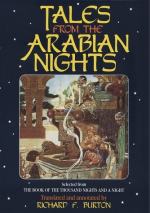[FN#300] Arab. “Hazir!” I have noted that this word, in Egypt and Syria, corresponds with the English waiter’s “Yes sir!”
[FN#301] Koran, Chapter of Joseph, xii. 19.
[FN#302] Arab. “Hanut:” this custom has become almost obsolete: the corpse is now sprinkled with a mixture of water, camphor diluted and the dried and pounded leaves of various trees, especially the “Nabk” (lote-tree or Zizyphus lotus).—Lane M.E. chapt. xxviii.
[FN#303] These comical measures were taken by “Miss Lucy” in order to charm away the Evil Eye which had fascinated the article in question. Such temporary impotence in a vigorous man, which results from an exceptional action of the brain and the nervous system, was called in old French Nouement des aiguilettes (i.e. point-tying, the points which fastened the haut-de-chausses or hose to the jerkin, and its modern equivalent would be to “button up the flap"). For its cure, the “Deliement des aiguilettes” see Davenport “Aphrodisiacs” p. 36, and the French translation of the Shaykh al-Nafzawi (Jardin Parfume, chapt. xvii. pp. 251-53). The Moslem heals such impotence by the usual simples, but the girl in the text adopts a moral course which buries the dead parts in order to resurrect them. A friend of mine, a young and vigorous officer, was healed by a similar process. He had carried off a sergeant’s wife, and the husband lurked about the bungalow to shot him, a copper cap being found under the window hence a state of nervousness which induced perfect impotence. He applied to the regimental surgeon, happily a practised hand, and was gravely supplied with pills and a draught; his diet was carefully regulated and he was ordered to sleep by the woman but by no means to touch her for ten days. On the fifth he came to his adviser with a sheepish face and told him that he had not wholly followed the course prescribed, as last night he had suddenly—by the blessing of the draught and the pills—recovered and had given palpable evidence of his pristine vigour. The surgeon deprecated such proceeding until the patient should have full benefit of his drugs—bread pills and cinnamon-water.
[FN#304] Here ends vol. iii. of the W. M. Ms. and begins Night cdxxvi.
[FN#305] In the next “Risah,” copyist’s error for “Rishah” = a thread, a line: it afterwards proves to be an ornament for a falcon’s neck. [I cannot bring myself to adopt her the explanation of “Rishah” as a string instead of its usual meaning of “feather,” “plume.” My reasons are the following: 1. The youth sets it upon his head; that is, I suppose, his cap, or whatever his head-gear may be, which seems a more appropriate place for a feather than for a necklace. 2. Further on, Night cdxxx., it is said that the Prince left the residence of his second spouse in search (talib) of the city of the bird. If the word “Rishah,” which, in the signification of thread, is Persian, had been sufficiently familiar




